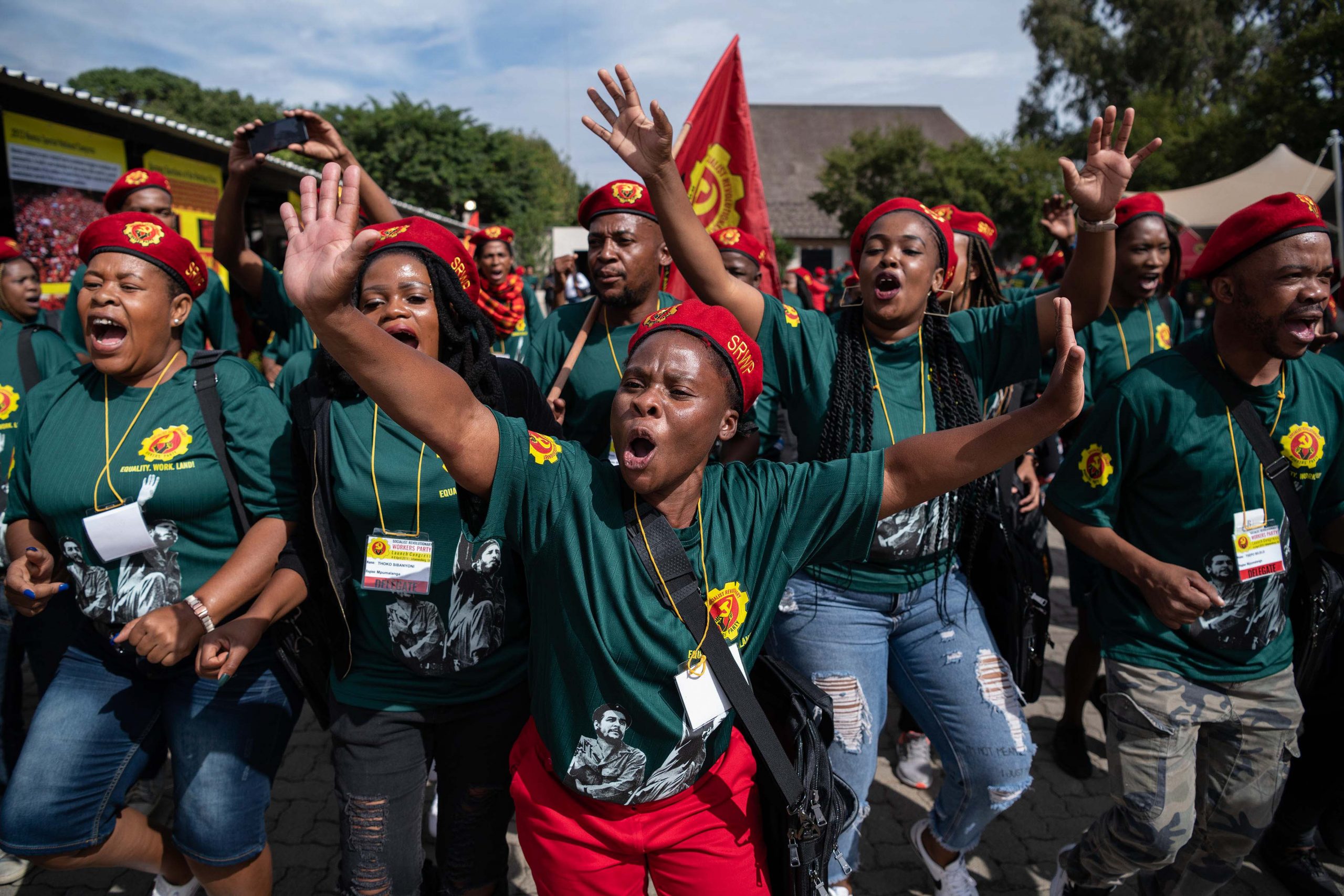New party aims for a socialist South Africa
Numsa’s Socialist Revolutionary Workers’ Party wants land, resources and wealth in the hands of the people. Could it fill the left-wing gap in South Africa’s political spectrum?
Author:
10 April 2019

The newly formed Socialist Revolutionary Workers’ Party (SRWP) has launched shortly before national elections under the slogan “equality, work and land”. The party aims to build a socialist government under which there will be employment for all.
It plans to ensure that land, natural resources and wealth belong to the people rather than private companies.
Lebogang Mabile, once a staunch ANC member, says he decided to change ranks because he believes that the SRWP has the interest of the working class at heart.
Mabile was among more than 1 000 delegates from all nine provinces that attended the three-day manifesto and congress launch that took place in Boksburg, Gauteng.
The launch, which began on 4 April and ran until 6 April, was attended by 54 international guests from countries including Zambia, Tunisia, Brazil, Spain, Ghana, Namibia and the United States.
Mabile joined the party “precisely because it speaks about socialism. It says all means of production, the land and everything must be controlled by the people of South Africa.
“I am saying this from the perspective of the poor and the working class in general, who have been exploited for a long time without having their own voice,” said the 34-year-old Carletonville resident.

‘I divorced the ANC’
Mabile told New Frame that he was a member of the ANC in the past. “My mother was a mayor where I am from. I was actually born in the ANC. I joined the ANC at the early age of 13. I divorced the ANC five or six years ago.”
He said the ANC has deserted the poor. “The ANC does not stand for what its policies stand for anymore. It has totally chosen to go against the people, especially the poor, blacks in particular. It has lost all touch with the people.”
With large posters of Karl Marx, Alexandra Kollontai, VI Lenin, Claudia Jones, Fieldmore Mapeto, Ruth First, Mbuyiselo Ngwenda and Chris Hani in the hall, the new party was clearly signalling its socialist orientation. An enthusiastic declaration of support was made for imprisoned former Brazilian president Lula da Silva.
There have been discussions in the trade union movement about the value of forming a workers’ party since at least the early 1980s. But the more recent roots of this new party lie in 2013 when, in the wake of the Marikana massacre, the National Union of Metalworkers of South Africa (Numsa) held a special national congress at which it decided to break away from the ANC and create a workers’ party.
After the break from the ANC, Numsa became a vociferous critic of then president Jacob Zuma and the corruption occurring under his administration. As a result, the union was expelled from trade union federation Cosatu. After the expulsion, Numsa went on to form the new South African Federation of Trade Unions (Saftu).
Party people
The SRWP held a pre-launch conference in Boksburg last year at which party convener Irvin Jim, who is now the national chairperson of the party, said: “Workers decided that the working class must organise itself by forming a worker’s party, and we were very clear at the time that workers must also present a united front to champion their struggles. That is how the party came about.”
Saftu general secretary Zwelinzima Vavi did not officially call for Saftu members to vote for the SRWP but his deputy general secretary at Saftu, Moleko Phakedi, was elected as the party’s deputy national chairperson.

Left-wing required
Steven Friedman, an academic, journalist and former trade unionist told New Frame that South Africa needed a left-wing party to fill up the political spectrum. He said the SRWP could fill that gap.
“We don’t have a left-wing party. Some people think we have a left-wing party. The EFF in my view is not a left-wing party. The EFF is concerned about racial issues, particularly those which mainly affect the middle class. It is not about class issues, redistribution and poverty,” he said.
Asked about the possibility of achieving a socialist South Africa under current conditions, Friedman replied: “The whole question of whether a socialist society is possible or not, or what it should look like, I think it is very early days to be asking questions like that because we are so far away from that.”
Related article:
Friedman also expressed the view that a message primarily centred around Marxism-Leninism might not attract voters concerned with immediate and urgent issues, and that it may be better for a left-wing party to start by campaigning around concrete issues.
“They [most voters] are very pragmatic, they’re concerned about immediate issues. A message which says ‘we think you are being exploited and things can get better’, I think people would find [that] attractive.”
Friedman suggested starting with issues such as “unemployment, high service charges and other issues concerning people”.

Recruitment
The SRWP acting national spokesperson Vuyolwethu Toli told New Frame that the party aims to build support outside of the industrial working class.
“The party recruits workers in workplaces and working-class masses who are unemployed in communities. The party includes other members of society, provided that they adhere to the party’s constitution,” he said.
The abolition of the private schooling system and creating a socialist state, which provides free uniforms, textbooks and stationery to learners, were among the key issues discussed at the launch.
Related article:
The party endorsed the nominations of 13 women and 17 men at the congress to lead its central committee, which is the new party’s highest decision-making structure, second to congress.
Jim as national chair, Phakedi as deputy national chair, Oupa Ralake as general secretary, Vashna Jagarnath as deputy general secretary and Andile Zitho as national treasurer make up the top five positions comprising the core leadership of the SRWP.
When New Frame asked Toli about the gender gap in the top five elected leadership, he said the leadership is a mirror of the current patriarchal society. “The expectation that any organisation can create a perfect balance of any structure is an illusion in the context of a capitalist system. We live in a society where women are suppressed and they rarely come to the front. The leadership of the party at this stage reflects this imbalance which exists in the capitalist system,” Toli explained.



